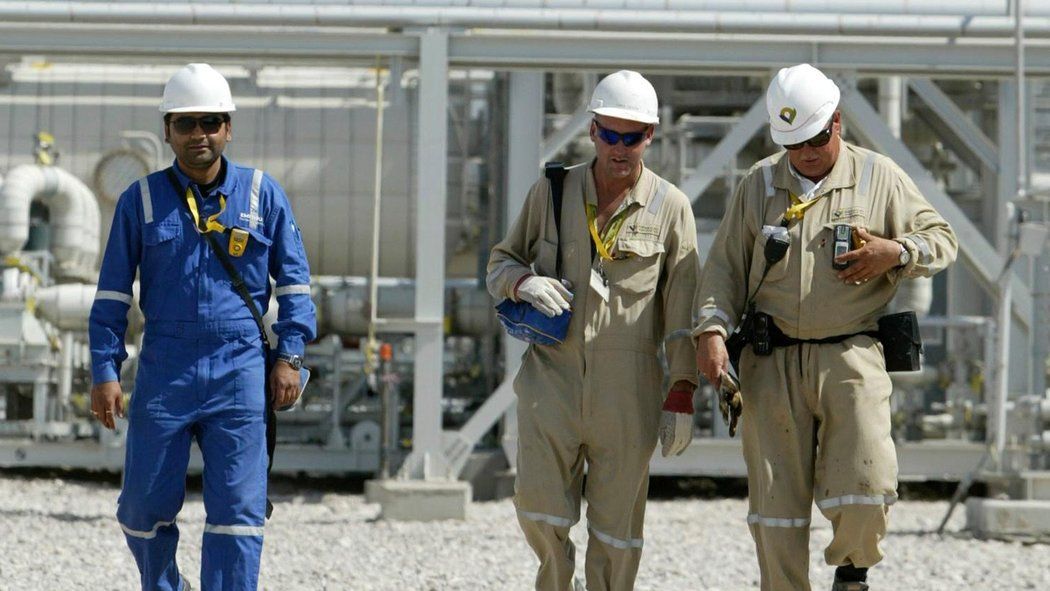 The Majnoon oil field in southern Iraq, operated by Royal Dutch Shell. Shell said its 4thQ profit fell 48%t. ReutersOil and gas multinationals record billions in profits, but a shifting energy landscape has taken its toll. Shell and Exxon Mobil posted disappointing earnings, further evidence the US oil boom isn't boosting the usual suspects, csmonitor.com reports.
The Majnoon oil field in southern Iraq, operated by Royal Dutch Shell. Shell said its 4thQ profit fell 48%t. ReutersOil and gas multinationals record billions in profits, but a shifting energy landscape has taken its toll. Shell and Exxon Mobil posted disappointing earnings, further evidence the US oil boom isn't boosting the usual suspects, csmonitor.com reports.
Oil and gas production is booming in much of the world, but it's not boosting Big Oil's bottom line.
As supplies of easily obtainable oil dwindle and prices remain flat, the world's oil majors are getting less in return for the vast sums they invest on big, risky projects that don't always pan out. Royal Dutch Shell and Exxon Mobil announced drops in fourth quarter profits Thursday. Chevron announced similar results Friday.
Big Oil is by no means broke. International energy companies still record billions in profits each quarter, and global oil demand is projected to grow for decades. But the shifting energy landscape has hit those companies hard, while benefiting smaller start-ups. Established firms have been slow to take up the disruptive technologies that have dramatically boosted US oil and gas production onshore, opting instead for ultra-deep drilling offshore in treacherous regions halfway around the world.
"Almost all growth in crude production globally is coming from small, nimble risk tolerant US independents engaging in fracking," Morgan Downey, a New York based commodities trader and author of the book "Oil 101," writes in an e-mail. "Big oil has missed out on fracking and is sitting on the sidelines with a heap of cash possibly waiting for a fall in oil prices, and biding their time for potential acquisitions of these smaller growth companies."
Shell posted $2.9 billion in fourth-quarter earnings in 2013, excluding identified items and on a current cost of supply basis. That's down 48 percent from $5.6 billion in the same quarter last year. It was the Anglo-Dutch company's least profitable quarter in five years.
The company attributes the losses to expensive exploration drilling in the Arctic, security challenges in Nigeria, and technical issues at refineries. Shell has invested in North American shale, but those projects lost over $2 billion (excluding identified items) in 2013. It plans to sell $15 billion of its assets between 2014 and 2015 and will put its Arctic exploration on hold for 2014.
"We haven’t always made the right capital choices and we need to react more quickly to changes and opportunities in the industry environment," Ben van Beurden, Shell's new chief executive, said in a statement. "For all the parts that make up our business portfolio, be it existing assets or new projects, we need to scrutinize harder whether they are sufficiently attractive and resilient."
Exxon Mobil announced Thursday its fourth quarter 2013 earnings were $8.4 billion, down 16 percent from the fourth quarter of 2012, mostly on lower natural gas production. Total earnings for the year slid 27 percent. Chevron said Friday that its quarterly profits fell 32 percent, as costs surged and new projects were delayed.
Big Oil may have fallen behind on US shale, but it may have more luck overseas as the rest of the globe looks to catch up with the oil and gas boom in the United States. Last year, Shell and Chevron signed big deals to develop shale plays in Ukraine, and there are many other prospects across Europe, Asia, and Latin America.
"As demand continues to grow, the oil majors are still in the business of supplying that raw material," Andrew Lipow, president of Lipow Oil Associates in Houston, says in a telephone interview. "The question is which geographic location makes the most sense for them to invest their money."
Some investors question the long-term value of fossil-fuel assets – concerned with a changing climate and the risk of more governments pricing carbon down the road. More than a dozen major foundations announced Thursday they would join a small but growing fossil-fuels divestment movement. The Park Foundation, the Schmidt Family Foundation, and the Wallace Global Fund are among 17 foundations who said Thursday they would pull their combined $1.8 billion in assets out of oil, gas, and coal companies.
“The financial risks of staying invested in fossil fuels are high because two-thirds of proven fossil fuel reserves simply cannot be burned, yet the markets treat this basic physics like it is science fiction,” Tom Van Dyck, financial adviser at RBC US Wealth Management, said in a statement.
“Either coal, oil and gas deposits become stranded assets, or we do,” said Mr. Van Dyck, who advised several of the signatories to the initiative.
 В Атырау -10
В Атырау -10